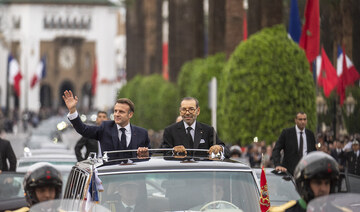MANILA: On the outskirts of Manila, a 2,600-hectare nature reserve has been lauded by top climate activists and film stars after it gained international recognition for one of the largest collaborative reforestation efforts in the Philippines.
Behind the rescue of over 2,000 hectares of that land is sisters Ann and Billie Dumaliang. They have been at the forefront of conserving the biodiversity-rich Masungi Georeserve and nurturing it as a geotourism site, which is home to lush rainforests, 60-million-year-old limestone formations and over 400 species of flora and fauna.
They have become the faces of conservation in the Philippines, a country named in 2024 as the deadliest in Asia for environmental defenders — for the 11th year in a row — with the killings of 17 activists.
The Dumaliang sisters and the nearly 100 rangers at the reserve are no stranger to the deluge of threats that come with their work, which range from physical to legal, and include disinformation and harassment campaigns.
Over the years, rangers at the reserve have been shot at by intruders and were the targets of booby traps and improvised explosives set across the landscape.
But the dangers that come with their conservation efforts have not deterred them from the mission to protect Masungi.
“We’re a small group and a team of young people. All of these groups that we’re up against have unlimited resources … how do we compete with these very powerful and well-resourced interests?” Billie, 31, told Arab News.
The sisters were among the trailblazers featured in TIME Magazine’s Next Generation Leaders last month, recognized for their work protecting Masungi from illegal loggers, land grabbers and quarrying companies.
Billie says TIME’s “empowering” recognition was a “symbol” that the international community has been paying attention to their team’s work and the challenges they face.
“A lot of times when you don’t have enough support at home, if your organization is repressed or harassed, sometimes it’s really the international community that provides the much-needed support,” Billie said.
The Dumaliang sisters help manage the Masungi Georeserve Foundation, which they founded in 2015 to lead and strengthen conservation efforts that began in the 1990s.
Through a private conservation model and a highly controlled geotourism program, Masungi has shot to fame as a showcase for sustainable reforestation.
Their work has also garnered support from prominent figures, including climate activist Greta Thunberg and Hollywood superstar Leonardo DiCaprio.
Despite the real dangers they face every day, some of Ann and Billie’s earliest memories were attached to the reserve — experiences that keep them passionate about their work today.
As children, they would visit Masungi with their father, a civil engineer and conservationist, as he worked on development, and later, conservation efforts.
“Instead of taking us to the mall on weekends, our dad would take us to these nature areas where he had projects,” Billie said.
The reserve was a regular destination for the Dumaliangs, back when it was still heavily barren — initially to give way to government housing projects that had eventually fallen through.
“The appreciation that we have for the outdoors, for the natural world came from seeing Masungi evolve from a place that was like that to the lush forest that it is now,” Ann, 33, said.
“The motivation for me and for Billie is really just to make sure that that stays and that it continues to exist past our time.”
Their foundation’s approach to conservation follows assisted natural regeneration, which allows these areas to naturally restore their ecosystems and regenerate through mitigating and preventing disruption.
This means the bulk of their work was focused on preventing encroachments on the area and securing the expansive reserve’s boundaries, with rangers guarding the area from intruders and deterring illegal activities such as logging and quarrying.
“They said in the early nineties, all that you could hear was the sound of chainsaws in the area. Today, it’s birds and different types of animals and the wind and the leaves. So, what it looks like now is a jungle and a thriving ecosystem,” Billie said.
“It took more than 20 years for that whole ecosystem to come back, and it started when we were able to make sure that we could manage disturbances to the landscape,” she added. “So we let nature do its thing, regenerate, reheal, and we assist through mitigating the threats.”
For Ann, the recent TIME feature was an encouragement not only for their team, but for the “frontliners of this work” in the Philippines and around the world, whose safety is often at risk for simply protecting the environment.
“These are constant harassments faced by the people who learn to love their land the most. And more often than not, they’re poorly heard, yet they’re the ones who are threatened the most.”



























